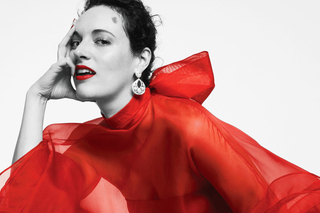
Thank You, Phoebe Waller‑Bridge, for Writing Real Reel Women
Her work lets complex women exist just so, without trying to fix them.

Dear Phoebe Waller-Bridge,
I want to eat your brain. Sometimes I want to hold hands with you and walk, swinging them, down the street. Perhaps give you a foot massage. Have you trust me enough to cut your hair. Maybe pinch your cheeks, even though it might annoy you a little bit.
I’m pretending to know you, not because I have ever met you, but because through your scripts you have made me, and so many other women, feel like you’re reachable; your characters represent the truest, darkest corners of women’s minds, and you let them exist just so, without needing to fix them, or portraying them in a derogatory way.
It’s really hard not to love you, Phoebe Waller-Bridge, after Crashing, in which you portrayed complex, lipsmackingly weird relationships between 20-somethings squatting in a derelict hospital, and *normalized* bizarre developments in life — *not as obstacles* to get over as fast as possible, but rather *as experiences* to learn and grow from. It’s difficult not to fall completely head-over-heels in love with you, Phoebe Waller-Bridge, after Fleabag, where you wrote and played the nihilist protagonist, bumble-fucking her way toward a semblance of peace and love amid dysfunctional relationships, grief, and loss. It is impossible to be impervious to your charm, Phoebe Waller-Bridge, after you transferred it in generous dollops to Killing Eve‘s Villanelle (brought to life by Jodie Comer), the queer, psychopathic killer who indulges herself with clothes, perfumes and sexual tension with Eve (Sandra Oh), the woman out to capture her. Your absence in the show’s second season was sadly palpable, when Villanelle and Eve got more one-on-one time, but their skin-tingling tension had somehow evaporated with your departure from the writing team.
And I will be completely honest: I yelled out a huge “Yeah!” to an empty room when you gave Kristin Thomas Scott’s Belinda the following epic monologue in Fleabag, after her character won a ‘Woman in Business’ award (which she calls “infantilizing bollocks”):
“I’ve been longing to say this out loud. Women are born with pain built in. It’s our physical destiny — period pains, sore boobs, childbirth. We carry it within ourselves throughout our lives. Men don’t. They have to seek it out. They invent all these gods and demons so they can feel guilty about things, which is something we do very well on our own. And then they create wars so they can feel things and touch each other, and when there aren’t any wars they can play rugby. We have it all going on in here, inside. We have pain on a cycle for years and years and years, and then just when you feel you are making peace with it all, what happens? The menopause comes. The fucking menopause comes and it is the most wonderful fucking thing in the world. Yes, your entire pelvic floor crumbles and you get fucking hot and no one cares, but then you’re free. No longer a slave, no longer a machine with parts. You’re just a person. In business.”
That’s the thing about you Phoebe Waller-Bridge — your writing is refreshingly representative of women’s actual experiences, not the tokenistic portrayal of women from all-male writers’ rooms. The women you write are what real women do, how they talk; their feelings, their choices, the way they show love, the manner in which they deal with trauma — it all feels representative of my own life decisions, or of the women around me, which makes us feel acknowledged, and in the process, validated.
You get that all of us live with the good, bad and fucked-up inside, and which part comes out can be a choice, albeit informed by whatever curveball life throws at us. You don’t glorify toxic behavior and relationships, but you make it okay to be toxic. You normalize self-destructive behavior, all the while offering alternatives that the characters can’t quite reach, but that keep the viewers watching in hopes that one day, they — and we — might. In the meantime, you make us laugh with your wit, a weapon you wield with abandon to shock and entertain.
Related on The Swaddle:
Kids Need More Strong, Female Characters in the Shows They Watch
Most of all, your characters — all strong women at war with a million different facets of their personalities — captivate. Fleabag, the protagonist, isn’t perfect — far from it actually; she is dissociated from life, selfish, incapable of emotional intimacy, and self-sabotagingly reckless and self-loathing. But you made us love her, root for her, even though she defied all the tropes of what a woman should be or do — like when she masturbates to former U.S. President Barack Obama giving a speech. Eve in Killing Eve is the same; she is one of the good guys at MI5 out to catch the psychopath. In the process, she falls in love with the idea of Villanelle. She grapples with the innate goodness she believed herself to have all of her life, and the sudden depravity she finds herself intensely attracted to. The ease with which you depict non-linear female characters, and defy stereotypically macho tropes in your male ones, makes me constantly amazed at the way you see the world. I’m just grateful you choose to share that gift with us.
“The line between adorability and monstrosity,” as you so aptly put to The Guardian, is where you took my heart. And when you proclaimed you love pain, and transgressive women, flutters abounded. But, most importantly, my love for you was sealed when you made The Guardian writer, Simon Hattenstone, teach you how to burp at will, and in return displayed your ability to time your farts “to perfection.” I love you.
Sincerely,
A fellow fart connoisseur
Rajvi Desai is The Swaddle's Culture Editor. After graduating from NYU as a Journalism and Politics major, she covered breaking news and politics in New York City, and dabbled in design and entertainment journalism. Back in the homeland, she's interested in tackling beauty, sports, politics and human rights in her gender-focused writing, while also co-managing The Swaddle Team's podcast, Respectfully Disagree.
Related


The Buzz Cut: Priyanka Chopra Jonas Commits To Mainstreaming South Asian Culture in Hollywood
